|
|
|
Sort Order |
|
|
|
Items / Page
|
|
|
|
|
|
|
| Srl | Item |
| 1 |
ID:
087544
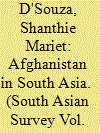

|
|
|
|
|
| Publication |
2009.
|
| Summary/Abstract |
Afghanistan seems to be sliding into chaos notwithstanding the initial euphoria that followed the toppling of the Taliban regime. The long-term stability of Afghanistan is mainly contingent upon its integration in a regional cooperative framework. The Afghanistan Compact adopted at the London Conference in January-February 2006 identified regional cooperation as a main plank of the international community's reconstruction strategy. However, not all stakeholders in the region share similar perceptions or interests in promoting regional cooperation. This article seeks to examine whether regional cooperation in South Asia could be an effective mechanism to bring in long-term stability in Afghanistan. Will regional cooperation augment Afghanistan's capacity to deliver basic needs to the Afghan people? Would its entry into the South Asian fold contribute to peace in that country?
|
|
|
|
|
|
|
|
|
|
|
|
|
|
|
|
| 2 |
ID:
087552
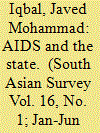

|
|
|
|
|
| Publication |
2009.
|
| Summary/Abstract |
The acquired immunodeficiency syndrome (AIDS) epidemic is now considered not only a health problem, but also a development issue as well as a security threat. While states have responded in varied ways to the AIDS epidemic, most have failed in combating it. What explains the variations in state responses to the AIDS epidemic? This article compares the state responses of Brazil, India and South Africa to AIDS with the help of a few variables: states' primacy to human security, socio-cultural norms, civil society activism and a rapidly changing strategic environment. This article demonstrates that a greater level of state's primacy to human security threats like HIV/AIDS and civil society activism produce a more successful state response. The article further suggests that social and political conditions do impact upon the state's response to AIDS. Prominent among them are the rapidly changing strategic environment and socio-cultural norms
|
|
|
|
|
|
|
|
|
|
|
|
|
|
|
|
| 3 |
ID:
087545
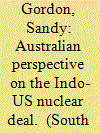

|
|
|
|
|
| Publication |
2009.
|
| Summary/Abstract |
Following its election in 2007, the Labour government imposed a moratorium on export of Australian uranium to India. This article argues that with the Indo-US deal and concomitant agreements now in place, Australia should agree to export uranium to India. It does so on the grounds that the agreements will adequately protect Australian uranium from misuse, will not unduly test the Nuclear Non-Proliferation Treaty (NPT) regime, could open out opportunities to meet important safety concerns, could help stabilise potentially dangerous vertical and horizontal proliferation and could also mitigate the region's burgeoning production of greenhouse gases. In supporting the agreements through nuclear trade with India, however, Australia should use any influence it is able to garner thereby to ensure that the Indo-US agreement itself is not seen as part of an attempt on the part of the United States (US), or any other power, to harness India as a means of containing China, and thus exacerbating what could become a destabilising tendency in the region.
|
|
|
|
|
|
|
|
|
|
|
|
|
|
|
|
| 4 |
ID:
087547
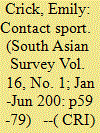

|
|
|
|
|
| Publication |
2009.
|
| Summary/Abstract |
Cricket is the favourite sport throughout South Asia. It can unite and divide polities, both internationally and intra-nationally. The history of bilateral cricket matches between India and Pakistan has always been closely connected to Indo-Pak relations; when diplomatic relations were at their lowest, the Test series were halted. However when bilateral relations were good enough for matches to be played, they were largely played in good spirit and the positive effects could be felt throughout both countries. Cricket has the ability to work on a multitude of 'tracks' through unofficial meetings with high level leaders, middle ranking elites, the media, business and the common man, to increase communications and break down negative stereotypes across the border.
|
|
|
|
|
|
|
|
|
|
|
|
|
|
|
|
| 5 |
ID:
087555


|
|
|
|
|
| Publication |
2009.
|
| Summary/Abstract |
Trafficking in and trading of human beings is one of the phenomena of urbanism. This article presents a simple 'explanatory model for human trafficking through urbanism'. Human trafficking, which is the biggest global illegal business after drug trading, has been declared an organised crime by the United Nations (UN). In order to crack down on these illegal businesses, the UN, in collaboration with many affected nations, has undertaken various measures, but has unfortunately met with little success. Trafficking in human beings continues to persist and the main players continue to accumulate considerable wealth through the exploitation of their victims. This article therefore explores the underlying forces responsible for human trafficking and presents an Explanatory Model for the Sustainability of Human Trafficking. The model draws from a case study of human trafficking from the Philippines to Malaysia.
|
|
|
|
|
|
|
|
|
|
|
|
|
|
|
|
| 6 |
ID:
087550


|
|
|
|
|
| Publication |
2009.
|
| Summary/Abstract |
India dominates the South Asian region in political and strategic terms. India's overwhelming presence, big brotherly attitude and the regional security initiatives taken by it are perceived by its neighbours as threats to their security. It is in this context that Bangladesh's threat perceptions of India and changes thereof are analysed in this article. Bangladesh's threat perceptions vis-à-vis India are diverse in nature varying from political, economic, environmental and strategic issues. The changing nature of such threat perceptions has led to insecurity in the region and has created strains in bilateral relations. The article analyses the changing nature of threat perceptions in Bangladesh determined by power, geographic proximity, offensive capabilities and perceived intentions. Apart from analysing the dynamics of Bangladesh-India relations, the article also attempts to identify the reasons for change in Bangladesh's threat perception of India.
|
|
|
|
|
|
|
|
|
|
|
|
|
|
|
|
| 7 |
ID:
087548


|
|
|
|
|
| Publication |
2009.
|
| Summary/Abstract |
This article analyses the causes, manifestation and consequences of political violence in Bangladesh. The analysis is based on two arguments: first, that there is a cyclical relationship between inter-party conflict, political violence, and inter-party enmity; and secondly, inter-party conflict and violence at the horizontal level leads to political non-cooperation and stalemate at the vertical level between the ruling party and the opposition. Political violence emerges from a deep rooted political culture of intolerance, antagonism, revenge and arrogance. Apparent immediate causes of political violence are expressions of underlying differences and rifts along the lines of ideological, political, religious and institutional dimensions. Political violence results in distrust, institutionalisation of violence as a legitimate means of political expression and socialisation of violence-politics for the new generation of party loyalists.
|
|
|
|
|
|
|
|
|
|
|
|
|
|
|
|
| 8 |
ID:
087543
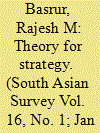

|
|
|
|
|
| Publication |
2009.
|
| Summary/Abstract |
The realist school of thought in international relations theory, under attack in the post-Cold War era for its numerous failings, has turned away from its focus on system structure to a refined version of its earlier form, which also focused on domestic factors and policy choice. But the neoclassical school neglects important systemic dynamics arising from variations in levels of economic and strategic interdependence. A refined neoclassical approach, by focusing on the relationship between degrees of interdependence and the role of structure, identifies the scope for optimal policy choice in different settings. For India, a nation on the threshold of major power status, this provides an improved basis for interpreting the changing international system and fashioning an appropriate broad strategy toward it.
|
|
|
|
|
|
|
|
|
|
|
|
|
|
|
|
|
|
|
|
|